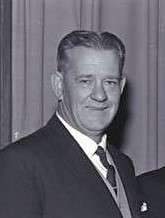1953 Onehunga by-election
The Onehunga by-election 1953 was a by-election held in the Onehunga electorate in Auckland during the term of the 30th New Zealand Parliament, on 19 December 1953. The by-election was won by Hugh Watt of the Labour Party.
| ||||||||||||||||
| Turnout | 13,749 (63.48%) | |||||||||||||||
|---|---|---|---|---|---|---|---|---|---|---|---|---|---|---|---|---|
| ||||||||||||||||
| ||||||||||||||||
Background
The by-election was caused by the death of incumbent MP Arthur Osborne of the Labour Party on 15 November 1953.[1] In early November 1953 Osborne announced that he was not seeking re-election and would retire at the 1954 general election due to ill health. As a result, Labour had already begun preparations to replace him in the electorate at the time of Osborne's death.[2]
Candidates
- Labour
The Labour Party selected Hugh Watt, who ran a local engineering business, as their candidate. Watt had stood unsuccessfully for Labour in Remuera in 1949 election and in Parnell in 1951 election.[3]
- National
Leonard George Bradley was selected as the National Party candidate. Bradley had contested Onehunga in the previous general election in 1951 against Osborne where he slightly increased National's share of the vote. At the 1949 election he had stood unsuccessfully for National in Auckland Central.
Results
The following table gives the election results:
| Party | Candidate | Votes | % | ± | |
|---|---|---|---|---|---|
| Labour | Hugh Watt | 6,868 | 66.99 | ||
| National | Leonard Bradley | 3,385 | 33.01 | -10.01 | |
| Informal votes | 13 | 0.13 | |||
| Majority | 3,483 | 33.97 | |||
| Turnout | 13,749 | 63.48 | -23.51 | ||
| Registered electors | 16,171 | ||||
| Labour hold | Swing | ||||
Aftermath
Watt represented the electorate until he retired at the 1975 election.[5] Bradley stood for National in Otahuhu in 1954 election and Waitakere in 1957 election, but was unsuccessful.
Notes
- Wilson 1985, p. 225.
- "Mr Osborne Dies After Long Illness". The New Zealand Herald. 16 November 1953. p. 10.
- Norton 1988, pp. 314, 331.
- Norton 1988, p. 295.
- Wilson 1985, p. 244.
References
- Norton, Clifford (1988). New Zealand parliamentary election results, 1946–1987. Wellington: Victoria University of Wellington Department of Political Science. ISBN 0-475-11200-8.CS1 maint: ref=harv (link)
- Wilson, James Oakley (1985) [First published in 1913]. New Zealand Parliamentary Record, 1840–1984 (4th ed.). Wellington: V.R. Ward, Govt. Printer. OCLC 154283103.CS1 maint: ref=harv (link)

